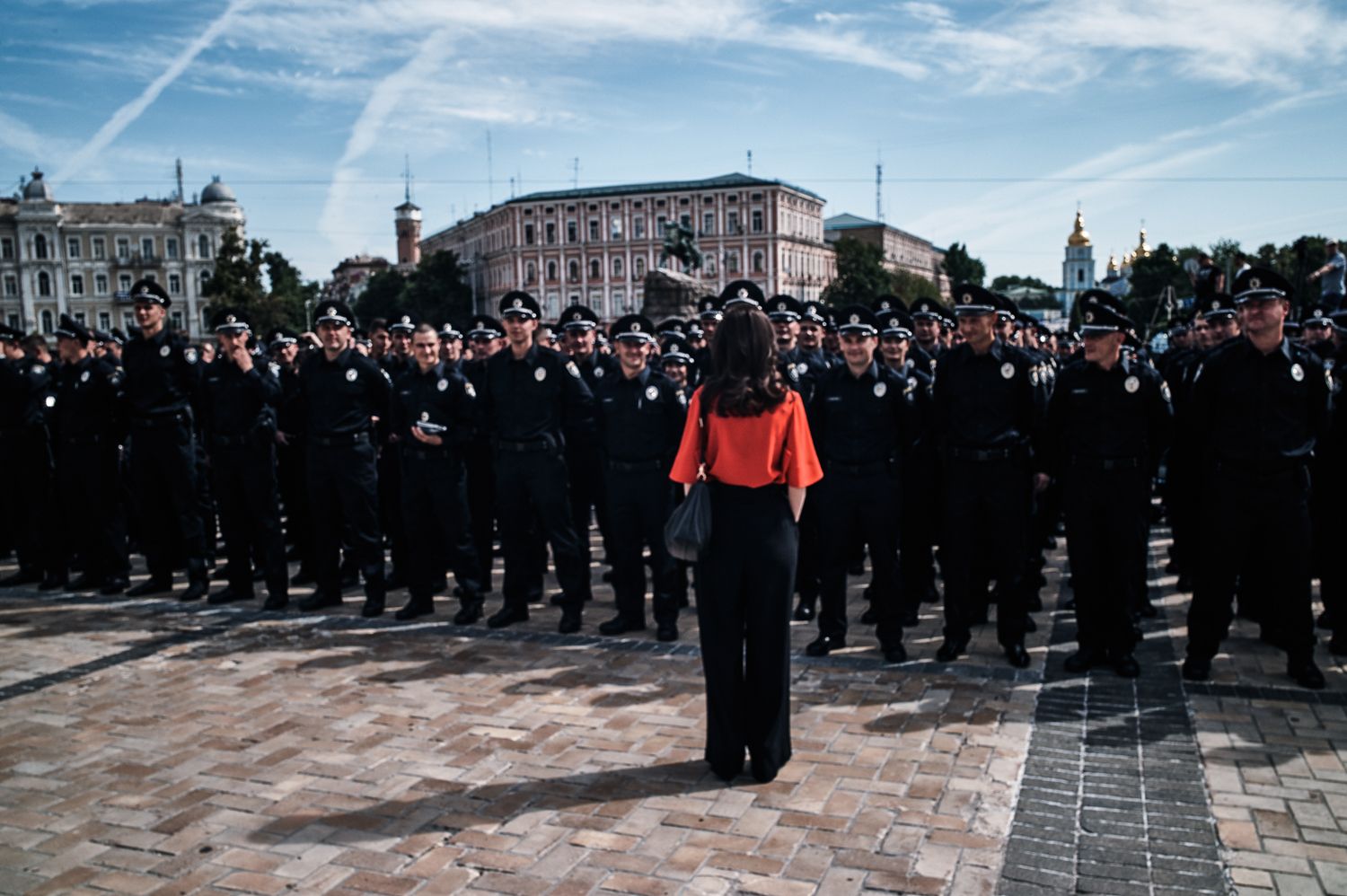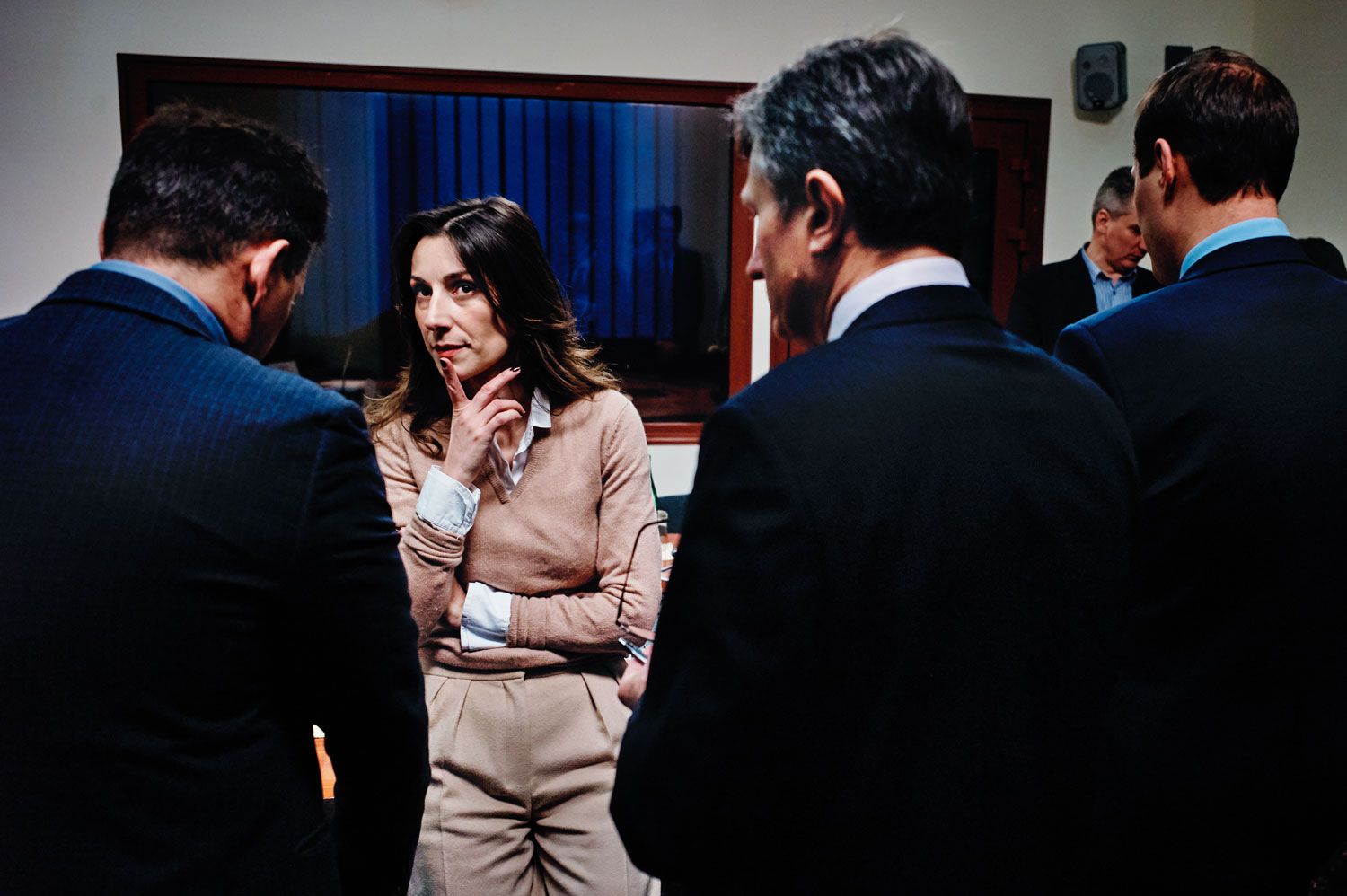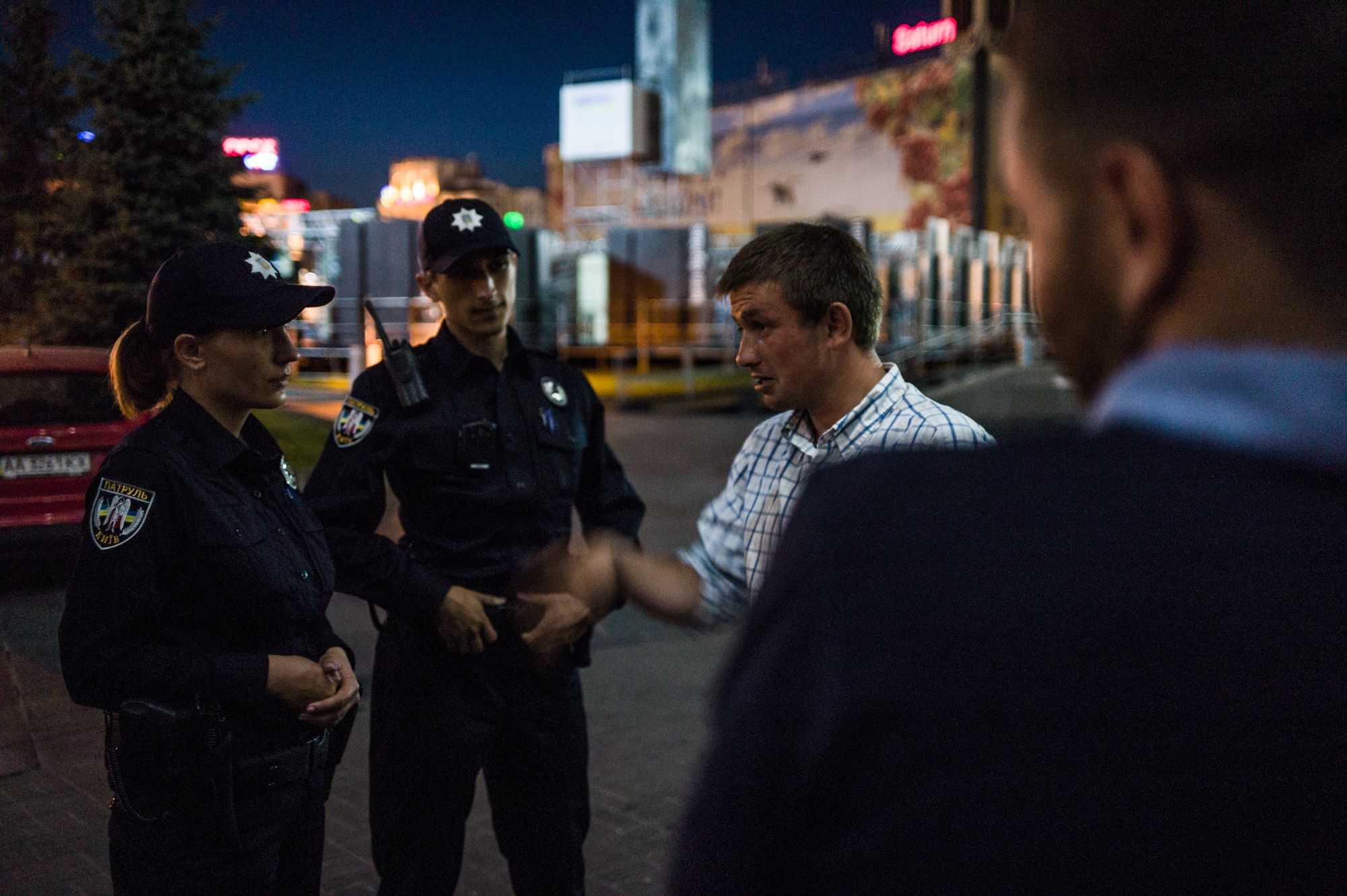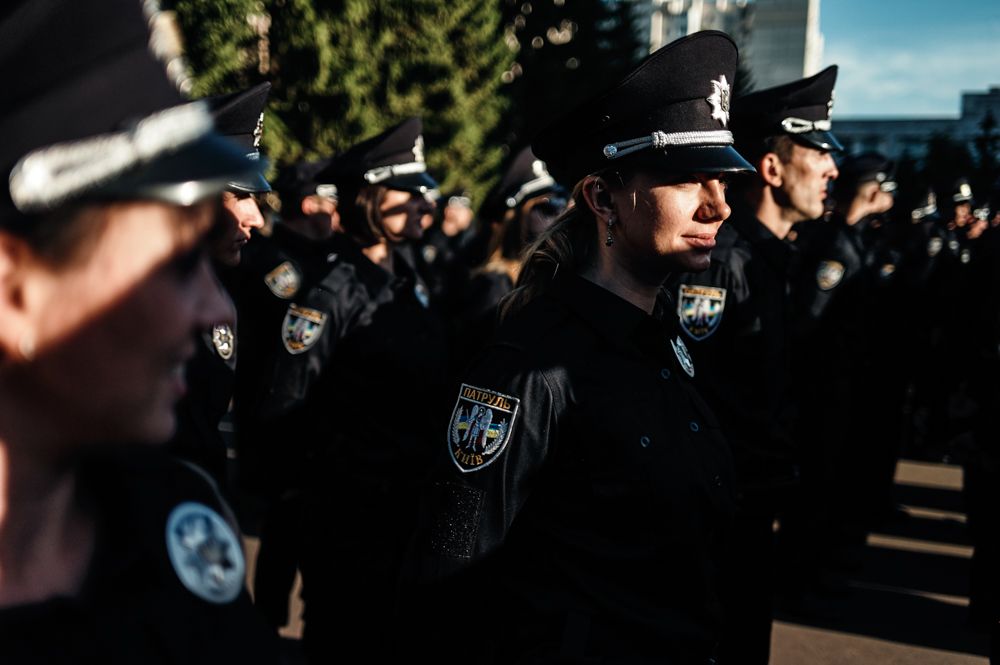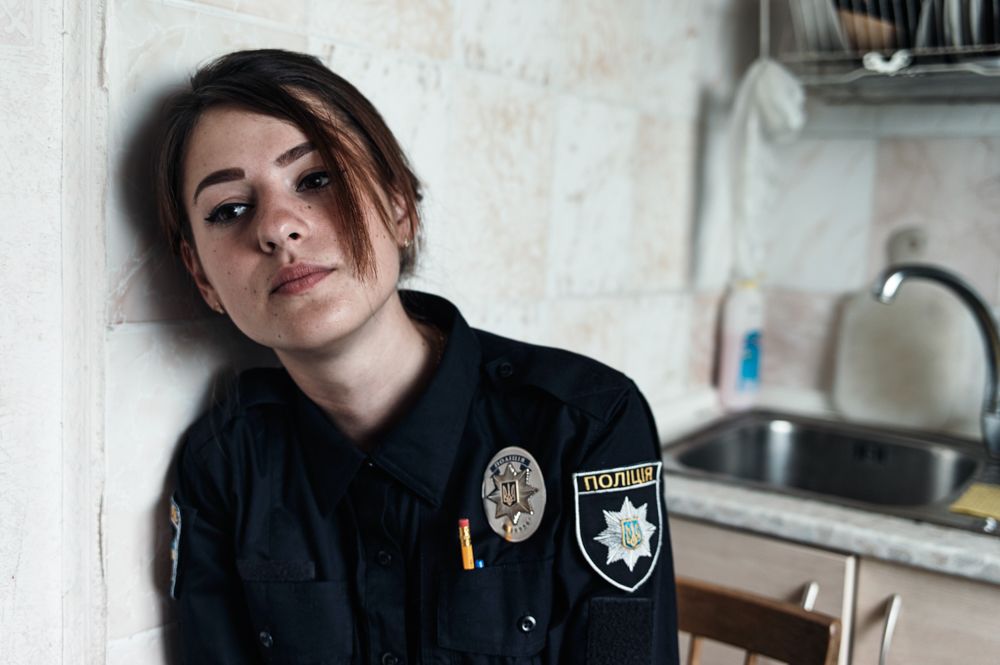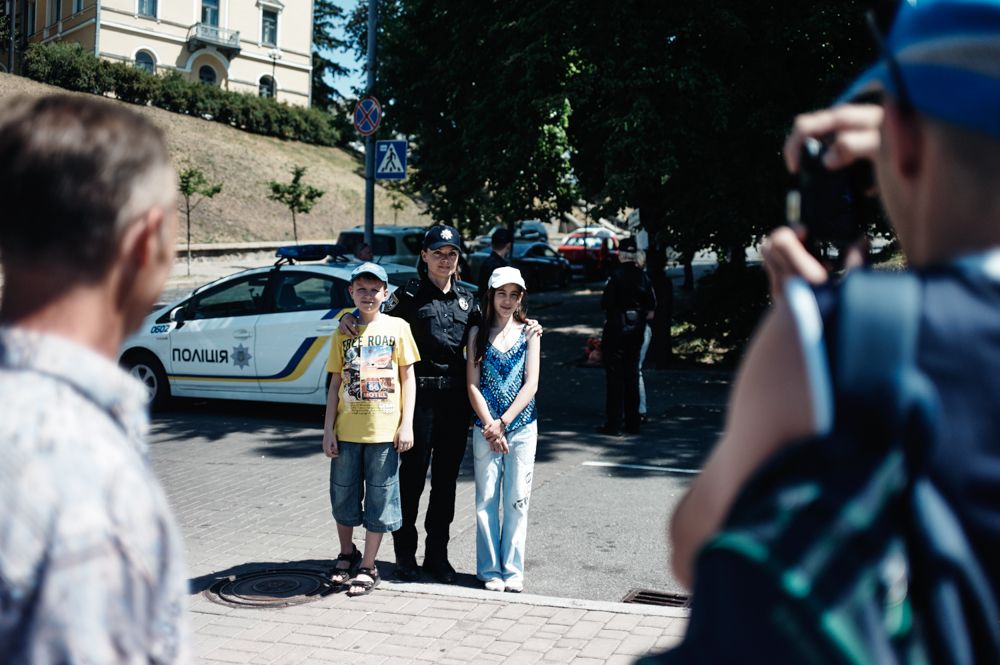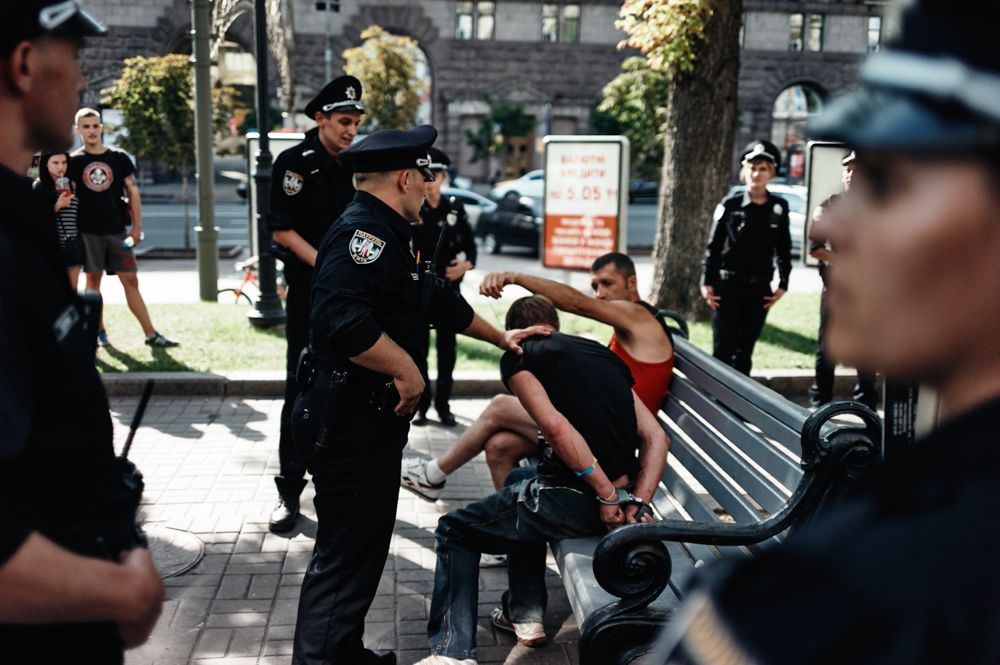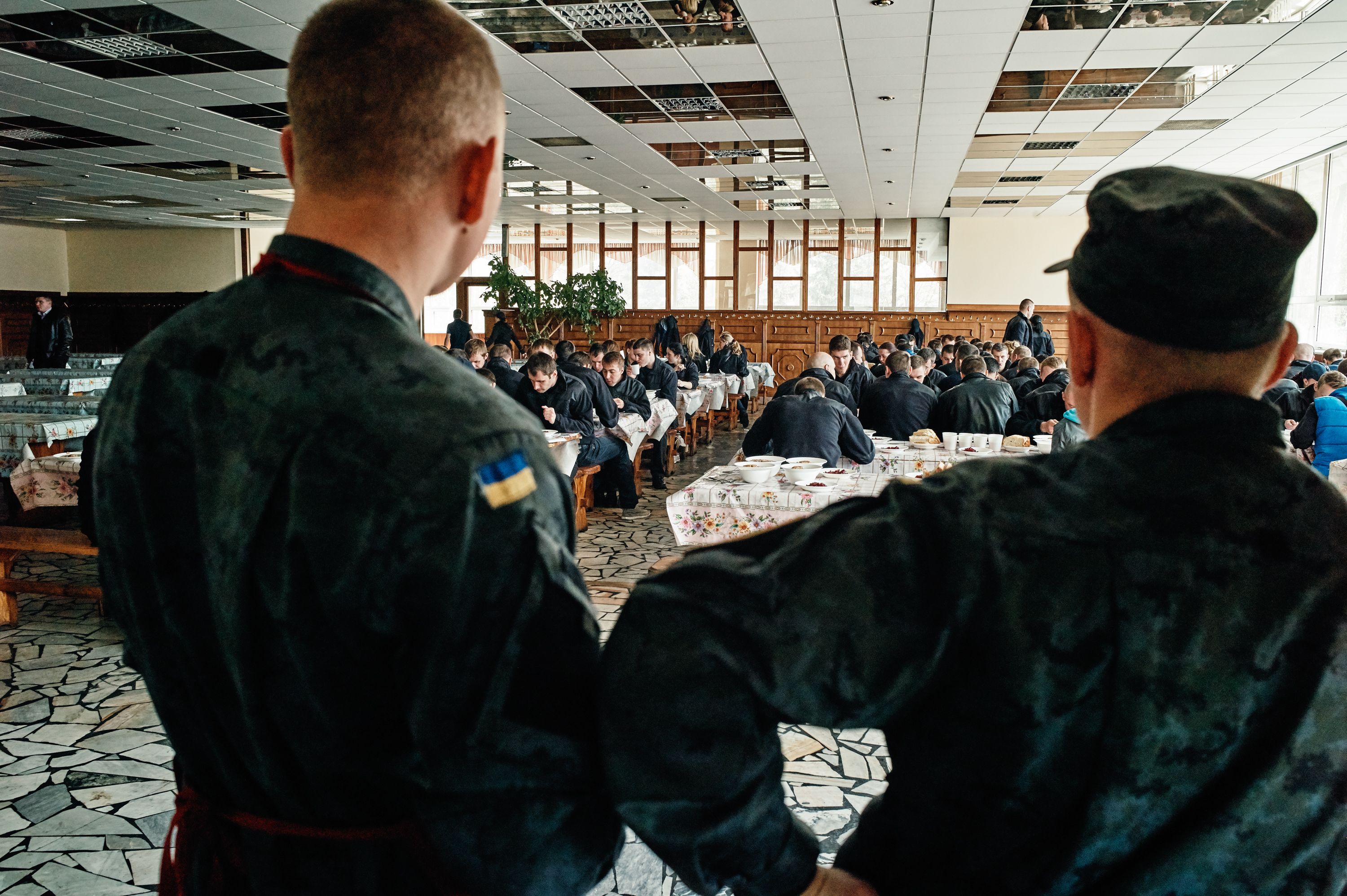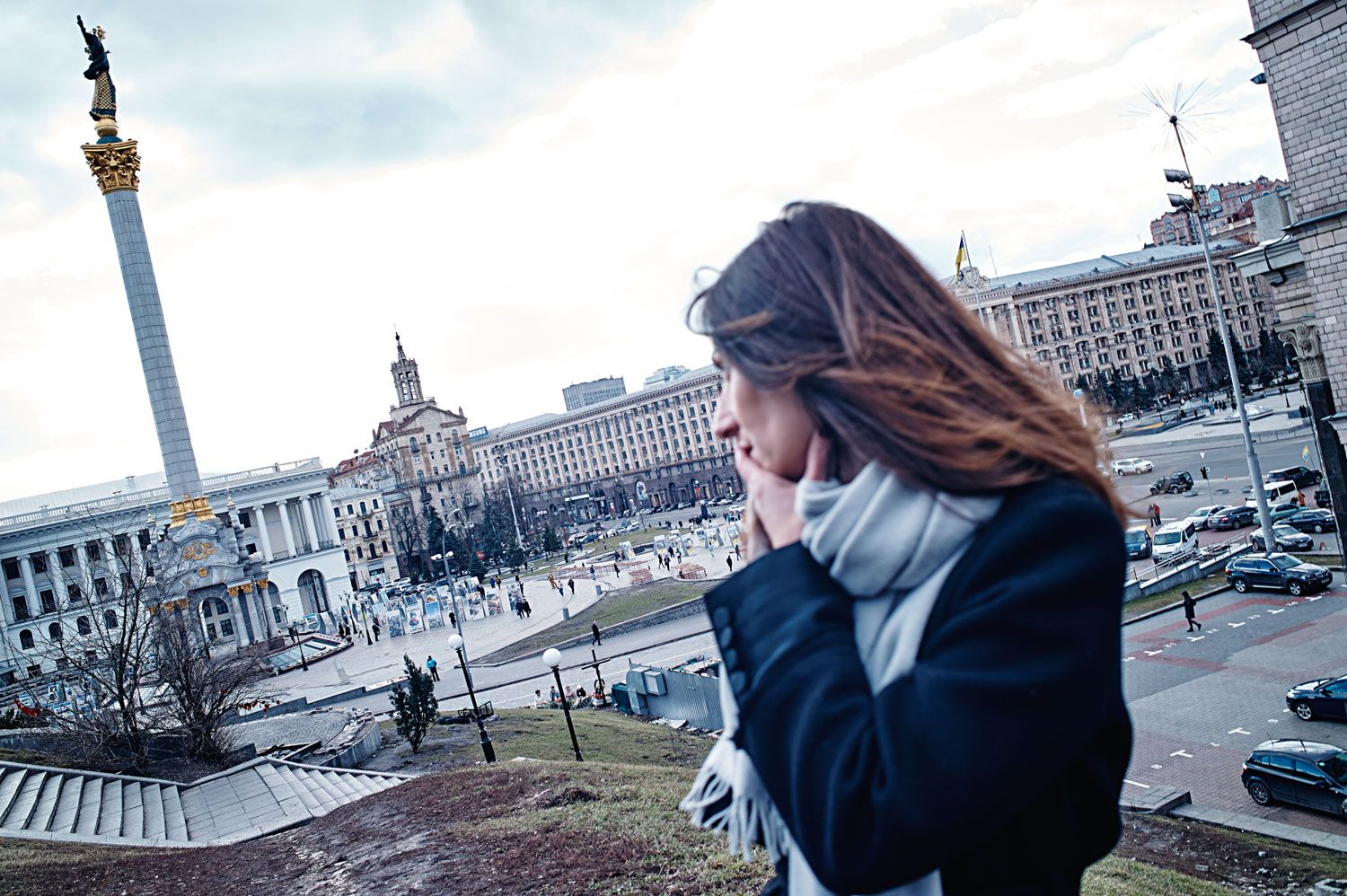KIEV, Ukraine — On the eve of her first day on the job, Oksana Kapitanska, 28, was as ready as she could possibly be. Her kit was laid out on her single bed, watched over by a dozen stuffed animals: black pants and a black shirt, a black cap, a belt, a pair of handcuffs, pepper spray, a phone charger, a pad of paper, a pen, a street map of Kiev, a first-aid kit, and a knee brace. She bought the knee brace herself. Some of the rest was bought by the state of Ukraine. But most had been donated by wealthier countries: The first-aid kit, with a picture of a red kangaroo on it, came from Australia; the uniform and the boots, made by the American company 5.11 Tactical, were donated by the United States; and the car that Kapitanska and her two partners would be driving that day was a gift from Japan. It was a Prius.
Kapitanska had gone through 10-and-a-half weeks of preparation, much of which had also been funded by the Americans, who had trained her trainers.
The process had exposed a fundamental difference in approaches to policing, at least as it is taught. “The American approach is too tender,” explained Kapitanska, who was once trained to be an officer in the militsiya, as the police was called in the Soviet Union and, later, in Ukraine. “Everything is based on respect for personal freedom. Maybe that sort of thing works in the U.S.” Or at least that's the ideal America exports, even in the age of Ferguson and Baltimore. I asked Kapitanska for an example, and she cited one I'd hear again and again.
“Here, when we detain someone, we begin with a relaxing strike,” continued Kapitanska, sipping tea at the kitchen table in a tidy apartment on the outskirts of Kiev that she shares with her retired-cop father and retired-doctor mother. A what? That's apparently what the American trainers asked, too. A “relaxing strike” is a painful blow to a nonessential body part -- like, say, the shin -- that makes the body go slack or relax. Without a relaxing strike, complained Kapitanska, “You have to perform all the detention maneuvers on muscles that are tense” -- meaning, you have to handcuff the person and get him into your Prius without having turned him into a rag doll first. During training, she said, she kept slipping up -- “muscle memory was kicking in” -- but as a graduate of Ukraine's new police academy, she knows that the relaxing strike and anything else that may be considered excessive force is “unacceptable.” Still, she added, “If I am confronted with an extreme situation, I'm going to have to use it.”
Kapitanska is one of 2,000 new police officers, or Patrol Police, who hit the streets of Kiev in July. Ten years earlier, she had gone to police college right out of high school, spent four years undergoing training that she found alternately dull and humiliating -- its only purpose, she felt, was to teach her to follow orders without questioning or understanding them -- and quit after a few months on the job. She worked for a tour operator and traveled a fair amount in Western Europe, until earlier this year when she heeded the call to join Ukraine's new police force -- because, she told me, she wanted her country to be as safe as the Western European lands she had visited.
This is precisely the idea driving Ukraine's current police reform. The government, brought to power by the protests of 2013-2014, known to most of the world as the Maidan (Ukrainian for “square”) and called the Revolution of Dignity in Ukraine, is scrambling to create a state out of the mess of transition and corruption that has ruled Europe's largest country since the Soviet Union broke up nearly 24 years ago. And no institution of the state is closer to the people and more riddled with corruption than the militsiya.
When the citizens of most post-Soviet countries speak about the corruption that rules and ruins their lives, more often than not they mean the daily presence of traffic cops demanding bribes and the absence of neighborhood cops, who will not work unless they have a profit motive. Back in the Soviet era, the militsiya was essentially a vast internal army, created to protect the regime from its citizens by terrorizing them. In the post-Soviet period, greed and corruption became the militsiya's distinguishing characteristics: If you paid enough, you could drive drunk and on the opposite side of the road, and if you didn't pay, you may not be allowed to drive at all; a similar algorithm applied to all aspects of law enforcement. Ukraine’s militsiya problem was even bigger than its neighbors: In February 2014, it was militsiya special forces that fired at protesters on the Maidan, killing more than 100 opponents of then-President Viktor Yanukovych. Soon Yanukovych fled the country, but the militsiya stayed. What feeble contract it had with the citizens of Ukraine had been destroyed.
The revolution ushered in a government whose mandate is to remake Ukraine in the European image. What it has to work with is a war with Russia in the east, an economy in shreds, entrenched oligarchs, an increasingly vocal conservative nationalist minority, and law enforcement so thoroughly discredited that it couldn't enforce anything if it tried. Of all these problems, only the police could conceivably be tackled quickly, effectively, and publicly. If Ukraine's militsiya could be magically replaced by a Western-style police, the country's dream of becoming a European state could move into reach. For the engineers of Ukraine's police reform, this is the dream. For its critics, the idea that a combination of political will, international donations, and popular support could conjure a fundamentally new institution is a travesty of reform.
***
Last December President Petro Poroshenko granted Ukrainian citizenship to then-36-year-old Eka Zguladze-Glucksmann, the former first deputy interior minister of Georgia. There, Zguladze-Glucksmann helped devise essentially similar reforms in 2006-2012. In Ukraine, she was given the title of first deputy interior minister and the task of creating a new police force under circumstances far more complicated than what she and her colleagues had once faced in Georgia. Zguladze-Glucksmann started by bringing in some of her old allies from Georgia and by aggressively seeking the political support she needed in Ukraine.
“Our first meeting took place late at night, in Eka's office, because you can smoke there,” said Mustafa Nayem, a 34-year-old member of parliament who, according to legend, launched the Revolution of Dignity with a single Facebook post. “Eka said that we needed to recruit 2,500 new policemen for Kiev alone and that we needed an applicant pool of 20,000 to 35,000 to do that. I said, ‘We need a publicity campaign to make that happen. What's the deadline?’ She said, ‘Two weeks.’ I said, ‘In that case we need to launch the campaign tomorrow.’ So we designed a booklet that very night. But our strongest publicity product was Eka herself: She is untainted by the politics of this country, and she knows how the police work. She is also a girl.” What he meant was that Zguladze-Glucksmann is a cinematically beautiful woman who seems capable of embodying Ukraine's European ambition. Not only did she create the new police force in Georgia, but she divides her time between Kiev and Paris, where she moved after Georgians voted her government out. Her husband is the French writer and filmmaker Raphaël Glucksmann, son of philosopher André Glucksmann.
Within four days of the meeting, a newly created recruiting center had collected about 7,000 applications; within a month, more than 34,000 had applied to be part of what the publicity campaign would call “my new police.” A series of tests, including general assessment, fitness, and physical exams, a personality test, and an interview, winnowed the pool to just over 2,000 people, more than a quarter of them women. They received 10 weeks of training -- roughly half the length of a basic training course received by a police officer in the U.S. state of New York and a fraction of the four or more years that an officer of the old Ukrainian militsiya would have spent studying.
“You can't teach someone to be a policeman in 10 weeks!” exclaimed Oleg Martynenko, a 49-year-old researcher on police psychology who runs a Ukrainian think tank on law enforcement. Martynenko authored the concept of police reform that was adopted by the new cabinet, but believes his concept was betrayed by efforts to push through changes on a tight schedule. “All they get is a general idea of the law, but they can't even fill out an arrest form correctly. What they need is to go out patrolling with more experienced officers.” But isn't the whole point to break away from the experience accumulated over the last century, to avoid having the militsiya pass its habits onto the new police? “It's not like the old officers would accept bribes in front of the new ones,” he said.
Having newly minted officers patrolling alongside more senior colleagues is what would happen after training in a Western country. What also happens there, though, is that new officers are quickly absorbed into the institutional culture of the existing police -- and if that culture is corrupt, they are taught the ropes of bribe-taking and extortion. In Ukraine, the militsiya's very presence would also taint the new police in the eyes of the public. So when the first 2,000 cadets completed the training program in Kiev, Zguladze-Glucksmann ordered the militsiya off the streets in the city altogether: They were still employed and present at precincts and administrative offices, but all patrolling, on foot and in cars, would be done by the young men and women in donated American uniforms.
Zguladze-Glucksmann has pinned all her hopes on her new force of 2,000 and similar groups that will be trained in other cities over the coming months: “It's like an injection of an anti-virus,” she said. “They set a standard that influences the rest of the system.” But even after new officers are recruited and trained around the country, the old militsiya, at 32,000 troops nationwide, will outnumber the Patrol Police.
Isn't it audacious to think that a small group of young and inexperienced police officers can change the nature of an institution whose very survival depends on resisting change?
When I posed this question to Nayem, he sighed with exasperation, took out a Moleskine, and started drawing. The diagram was simpler than I expected from the setup: a large rectangle and a much smaller one. “Let's say we have a barrel of dirty water,” he said, pointing at the larger rectangle. “And we have a glass of milk.” That would be the smaller one. “We poured the glass into the barrel, and everyone is saying, 'That's just as dirty as it was.' But here is the thing: We are not pouring the milk into the water. We are building a parallel system. And if there is ever a confrontation, which system is society going to stand behind?” The glass of milk, obviously -- assuming it has indeed stayed separate and untainted.
But the new police and the old militsiya have to interact constantly. The street is supposed to separate the Patrol Police from the militsiya: The former is tasked with patrolling the streets, and the latter has been instructed to stay in the precincts. But when officers of the Patrol Police detain someone, they have no place to take them other than the militsiya-staffed precincts (from which, in the first few day of patrolling, some of the detainees were promptly released). Because the Patrol Police includes only patrolmen and all the existing investigative staff remains part of the militsiya, all crimes must be investigated by the militsiya before they can be prosecuted. In fact, for the time being, the Patrol Police cannot take any measures against people suspected of committing a criminal offense. On her first night of patrolling, Tatiana Koretskaya, a 28-year-old former defense attorney, started filling out an arrest report for a shoplifter when she realized the total value of the five chocolate bars the man was carrying qualified his offense as criminal. She had to call the local militsiya to come in and take over. “I really screwed up,” she said. “I bespoiled a form.”
Later that night, I joined Tatiana and her two partners, Mikhailo and Dmitro, walking through the Maidan, Kiev’s main square.
“Heil Hitler!” shouted a middle-aged man from a short distance away. He seemed drunk, like many people walking the center of town after midnight. The trio walked toward him.
“You have put on an American uniform! But you are in Ukraine. You should be wearing a Ukrainian uniform.”
By shouting the Nazi salute, the man had been making the connection most often made by Russian state media, which claim that in Ukraine pro-Russian forces are fighting American “fascists.”
“Unfortunately, uniforms of this quality aren't yet made in Ukraine,” said Dmitro.
“So why'd you put it on?”
“This uniform is worn by the police in accordance with the minister's order.”
“How much do they pay you?”
“That's proprietary information.” It's not. The Patrol Police have a monthly salary of 8,000 hryvnias, which is a bit less than $400 and more than three times the salary of a rank-and-file militsiya officer. By Ukrainian standards, it is decent, if not excellent, pay.
Two men walked by. “Nice uniforms,” observed one.
A middle-aged couple pulled Tatiana aside for a talk. It was tense and a more than a little muddled -- the man and woman were either tired or slightly drunk, or both -- but it was a variation on a conversation many of the new police had been having with people throughout the day. Were you at the Maidan? Are you serving the Revolution? This particular couple were volunteers who had been fighting in the east and were in Kiev to take a few days' vacation from the war. And the conversation, like so many others, was an effort to figure out what the legacy of the Maidan is, more than a year after the protesters' triumph: Is it the war in the east, brutal, dragged out, and hopeless? Or is it the young men and women in American uniforms, with their message of hope and their pretense of peace?
Two young women asked me to use their phones to take their pictures with Mikhailo and Dmitro and giggled all the way through.
In the space of 15 minutes, the three police officers had experienced the full range of public reactions to “my new police.”
Tatiana later told me she had first wanted to join the militsiya about six years ago, when she graduated with a law degree, but she would have had to pay a bribe to secure a position. After staying at home with two children for a few years, she became a defense attorney, only to discover that she was expected to deliver bribes to judges. When she learned of the new police recruitment effort, she whipped herself into shape -- she had been unable to do a single push-up before she started working out -- and now, for the first time in her life, she had a job that felt honest and meaningful. She was not in it for the money: Her husband Nikolai, a computer programmer, made enough to support the family and even take two annual weeklong trips to the Black Sea.
Tatiana, like Oksana Kapitanska, is the quintessential face of the new police: Most people inside the reform effort told me the recruits were overwhelmingly college-educated and motivated by patriotic politics rather than money, which they could easily make elsewhere. “They are inspired,” gushed Khatia Dekanoidze, former Georgian education minister who is now in charge of training Ukrainian police. “You can see it in their eyes when they come back from their shift, tired, but their eyes are burning. It's the eighth wonder of the world!”
***
The eighth wonder of the world shares space in an old, monstrously huge Interior Ministry building on the outskirts of town with a militsiya academy; the new police, in their heavy black uniforms, mix without mingling with militsiya cadets in gray chintz Soviet-style uniforms.
In the late morning on July 8, one of the vast gray hallways of the building filled with the new police getting off their first shift. The changeover is supposed to happen at 8:45 in the morning, but this was only Day 4 of patrolling, and the timing had turned out to be difficult to pin down: Officers didn't know what to do if the end of their shift caught them in the middle of a policing situation, or whether to respond to a call that came in when they were on their way back to headquarters. A giant traffic jam of white-blue-and-yellow Priuses at the turnoff to the building made things even worse. In the end, the process of changing shifts stretched for five hours that day.
In the hallway, police officers laid out their papers on deep windowsills and started writing the first shift reports of their careers. They looked like school kids copying each other's homework assignments. Cleaning ladies in short blue chintz coats and soft slippers completed the picture.
“Write 'trans-port-a-tion,'” said an officer, using the Slavic syllable-by-syllable dictation technique to help his partner. “Oh, you can just write 'car.'” It would take them nearly an hour to write up their uneventful 24-hour shift (they would soon go over to daylong shifts, but a scheduling snafu had turned the first few days into marathons). Not only did they have to make their reports sound official, but they had to write them in Ukrainian. A Ukrainian-language proficiency test was a requirement for acceptance to the training program, so these two officers had to have passed it, but they, like a majority of residents in Kiev and many people in the rest of the country, had clearly grown up with Russian as their first language.
“Write, devushki. No, divchiny. No, devchata,” continued the one doing the dictation, groping for the Ukrainian word for 'girls.' “Write, devchata in a state of severe alcoholic intoxication⎯”
“The cases aren't agreeing,” piped up the young man doing the writing. Nor was the terminology correct: The appropriate way to refer to young women in an official document would be gromadianke, the feminine form of 'citizens' -- but neither of the young men seemed to realize this.
“Well, whatever. At least we didn't smash up the car.” A few Priuses had suffered damage ranging from light to severe.
“Take your foot off the radiator!” shouted the cleaning lady. The one doing the dictating did and continued.
“‘As a result, the conflict ended.’ Or, ‘was ended.’ Write, ‘The conflict was completed.’ What did we do next? Write, ‘We responded to a call from a woman who was stuck in an elevator with her children.’” To address his partner directly, he switched to Russian: “Remember, the elevator dispatcher wasn't answering?” Then he switched to Ukrainian again: “Write, ‘As a result, a service was summoned’ -- girls, do you know what to call an elevator man officially?”
Two female officers one windowsill over shrugged their shoulders in unison.
“Write, ‘As a result of which, a repair brigade was called.’ No, write, ‘A brigade of elevator repair specialists was called.’ All right, now you can write, ‘There were no problems with patrolling.’ No -- how do you say 'in general'? Write, ‘Generally speaking, patrolling went successful.’ No, write, ‘Generally speaking, patrolling was conducted successfully.’”
Generally speaking, patrolling had indeed been conducted successfully. Between July 8 and 11, Kiev's 2,000 new police officers responded to 4,418 incidents, roughly twice as many as the old militsiya had handled over the course of three days a week earlier. Response time had gone down despite the increase in the number of calls. Zguladze-Glucksmann's assistant, Anastasia Shmalko, who prepared the statistics, added a note suggesting the increase in calls itself could be attributable to the public's desire to test the new police or “to increase in trust.” Both explanations seem reasonable: The city's residents have been experimenting to see whether the new Western-style police will act like cops from American movies and have been calling in not only “stuck in the elevator” emergencies but even “cat in the tree” incidents. If social media reports are to be believed, cats have been consistently saved. Zguladze-Glucksmann's people and Nayem have been running social media campaigns of their own, lauding the new force and invariably including in their posts the slogan “my new police.”
As for the messier shift change operations, Zguladze-Glucksmann's people didn't want me to see those: In the absence of an official permission, I sneaked into the Patrol Police headquarters to watch the shift change with the architect who was giving me a tour of the renovations in progress. The architect's own story is a quintessential “my new police” narrative. Two years ago, Akim Vishnevsky, then 29, had built a successful enough architecture practice in Simferopol, a city in Crimea, to buy an ancient BMW.
Then he joined the Maidan.
When the revolution won, Vishnevsky had lost everything: His hometown was occupied by Russia, his parents back in Crimea had become rabid Putinites, his practice was gone, and all he had left was his BMW. He started the process of emigrating to Poland. Then he got a call from Zguladze-Glucksmann's assistant, whom he had met through friends: The new police needed an architect. The force needed new headquarters, but the Interior Ministry's own service had drawn up something drab enough to derail the whole reform effort. While other candidates were still haggling over price, Vishnevsky drew up some sketches and got hired. “I don't charge them a market rate,” he told me. “Just enough to keep the car fueled and to live on.” Now that life had acquired meaning again, he stopped his emigration efforts.
The requirement that Vishnevsky grasped is the crux of the Zguladze-Glucksmann effort: The police in Ukraine needs to be not simply reformed but remade entirely. It needs to act different, sure. But to gain the people's trust, and to ensure that the glass of pristine white milk from Nayem's analogy doesn't mix with the vat of dirty water, it also needs to look different -- hence the new uniforms. It needs to sound different; the new recruits received speech and communication coaching. And it needs to feel different -- so the space in which the public comes in contact with the police must be reimagined.
The ministry had envisioned the new police headquarters looking like a generic Soviet bureaucracy, with giant desks, cramped waiting areas, and a lot of blue. Vishnevsky shrunk the desks, added air and light, and -- his proudest achievement – an accessible bathroom for the disabled. To appreciate this accomplishment, it is not enough to know that this may be the only disabled-accessible public bathroom in a government building in Kiev: One must also know that at the central Interior Ministry building itself, the fourth floor women's bathroom stalls are outfitted with squatting pans. The stench of decades hangs over them. And it is on this floor that otherworldly, Parisian-Georgian First Deputy Minister Zguladze-Glucksmann has her offices, where she holds meetings until all hours of the night, every night, trying to conjure an otherworldly police force for Ukraine.
The new, moderately pleasant space Vishnevsky has created in the old militsiya building lets out into a Soviet-era lobby of monstrous proportions: gray granite floors, brown sandstone columns, and a lot of ‘60s-chic square emptiness. Vishnevsky told me he wants to put a glass cube in the middle of this space and make it the new police force's press office. It's the perfect architectural metaphor for the police reform experiment: a beautiful and eminently fragile human-sized edifice that is placed right in the middle of a giant hostile institution that could crush it with but a slight shudder.
Glass structures were a key symbol of Georgian police reform: Following the 2003 Rose Revolution, the new government led by Mikheil Saakashvili focused on the police as the institution most riddled with and most symbolic of corruption. Everything had to be changed: the people, the uniforms, and the name of the force itself. The old militsiya and traffic police were abolished, their 16,000 jobs eliminated, and an all-new-in-every-way force called the Patrol Police hit the streets. They would also be paid a decent wage, to discourage corruption. Then Georgia started building new police precincts and offices out of glass, both to symbolize transparency and to ensure it literally.
I was reporting from Georgia in 2008, the year the glass police buildings started going up in the capital city of Tbilisi. Residents treated them, and the patrol police in general, as a tourist attraction and a point of pride: They showed them to visitors and bragged of being able to get documents done in a day and of never having to pay bribes anymore. A few years later, when I visited again, the sheen had worn off: Tbilisi residents continued to point out what they called the “glass palaces” but they had also started grumbling. Things, they said, were not perfect – but yes, documents were still processed at breakneck speeds and extortion had been all but forgotten. In other words, the new police, which had seemed like a miracle, were now simply human, and good, trusted police.
Then, in 2012, the glass palaces cracked spectacularly. Several Georgian television channels broadcast video shot in a Tbilisi prison, which was also part of the interior ministry's domain; the tapes showed prison personnel raping and torturing inmates. The interior minister fired his corrections chief and a few days later resigned himself, making Zguladze-Glucksmann acting minister of the interior -- a position she kept until Saakashvili's government was voted out a month later. Many Georgians remember the prison scandal as the final nail in Saakashvili's political coffin, but it should perhaps be remembered as the ultimate proof that his reforms had been successful: It is hard to imagine another former Soviet republic in which tapes like those would not only be aired on national television but would bring down senior government officials.
The task in Ukraine is infinitely more complicated than in Georgia -- and the fact that Ukraine has nearly 10 times the population of Georgia is the least of it. “The Rose Revolution was a revolution -- it ended an epoch, and it started a new one,” said Zguladze-Glucksmann. “It changed the elite.” But while former President Yanukovych and some of his closest allies fled Ukraine after the revolution, much of the old financial and political elite has refused to budge. Zguladze-Glucksmann and other former Georgian officials (including Saakashvili, now serving as the appointed governor of Ukraine's Odessa region), as well as other assorted foreigners in the government, are part of an effort to dislodge some of the old guard. The goal is distant and possibly unattainable.
Take the new law that established the Patrol Police. First, Zguladze-Glucksmann found that she couldn't draft her own legislation: By the time she got to Kiev, two different drafts had already been submitted to parliament, and the legal window for submitting an alternative bill had ended. She schemed and negotiated to create a compromise draft, which was finally passed just as the first cadets were about to graduate, but along the way she sacrificed a number of provisions that Martynenko, the author of the original concept of police reform, believes are essential.
Ukraine's militsiya, like the Soviet militsiya before it, was a giant military force. The agglomeration that needed to be reformed included, in addition to various local police forces and traffic police, the national guard, several kinds of special forces, and the border guard. It includes a growing group of men who volunteer to fight the Russians in the east of the country: They are formally inducted into the police before they are issued firearms and sent to the front. The reformers wanted all those military and paramilitary forces removed from the jurisdiction of the interior ministry; they failed. The militsiya also had military ranks, ranging all the way from private to general -- a source of the militsiya's quasi-military identity and also of much of the corruption, as the higher ranks were bought and sold. The reformers wanted all the brass eliminated -- they would leave only a few ranks, like those that exist in American police forces: an officer, a sergeant, a lieutenant, and a captain; they failed. “The generals' lobby intervened,” explained Martynenko. The brass refused to become extinct.
Zguladze-Glucksmann uses the word “frustrating” to describe the legislative process, but she also uses “democratic,” “pluralistic,” and even some words from the hopeful side of the spectrum, like “sustainable.” She thinks she won some important structural changes. The national chief of police will now be a contract worker whose term will not be ruled by election cycles; in theory, this should grant him or her an important measure of independence from the politicians. In addition, the law contains an exhaustive description of the rights of police -- an important measure in a country whose most recent national trauma was caused by police violence. Most important, the law allows the new Patrol Police to begin functioning -- that is, patrol the streets, respond to calls for help, and detain people suspected of offenses, to hand over to the militsiya for further processing.
After the new police began patrolling in Kiev, recruitment efforts got underway in cities around the country. In the western town of Uzhgorod, the site of a recent confrontation between the government and armed right-wing fighters, there were 15.5 applications for every vacancy in “my new police.” Back in Kiev, a couple hundred cadets were still finishing up their training even after the rest had started patrolling. They had already received and taken in their oversized American uniforms, and they had heard troubling reports from those who had already started work. These made them edgy.
“People are nervous,” said 34-year-old Anna Dubina, a former car saleswoman who said she had chosen the police for the job security and financial stability. “The entire world is watching Ukrainian police reform. You'll see -- after a week on the job, some people will be having nervous breakdowns.”
“The entire law enforcement establishment hates us,” said 26-year-old Georgy Belenky, a recent law graduate who admitted the police was by far the best paying job he was likely to get. “We are going to have lots of problems, especially when they all get laid off. They are going to create issues for us. And we are too soft.”
“Too soft” refers at least in part to the training -- not only to the way the cadets were taught not to use excessive force but also to classes taught by psychologists who focused on communication techniques and by civil society activists who taught a series of classes on tolerance. Many of the instructors chosen for this unit were LGBT activists, who probably exposed the cadets to more new information over the course of a few class hours than they got in the entire 10-week term.
“They taught us that we can't call prostitutes 'prostitutes' and drug addicts 'drug addicts.’” Why not? “Because 'prostitute' is an insult. We should be calling them 'criminal sex workers,' and if prostitution is legalized, then we'll call them 'sex workers.’”
Everyone I asked about the “tolerance unit” told me about the terminology, but the focus of the unit was actually on gender issues. The cadets learned about domestic violence and the very concept of spousal rape. I looked at their quiz and exam results -- it was clear that even after a few weeks of training, these ideas were still as foreign to the cadets as the red kangaroo on their first-aid kits.
The reasons for including the tolerance unit, and for the cadets' poor performance on it, are obvious: Ukraine has a sexist and xenophobic culture, and the militsiya culture is even more sexist and xenophobic than that of the country as a whole. Changing these attitudes is an essential part of replacing the repressive militsiya with the European-style police of the government's dreams. But training such as the cadets received is notoriously ineffectual at changing attitudes. (In fact, a recent British study of police reform aimed at confronting institutional racism found that the effort as a whole may have served to make racist attitudes more entrenched.) Changing institutional culture, even in one respect, may well be impossible -- even when the institution's culture trails societal attitudes and there is clear political will, which, as the fate of the law on police shows, may not be entirely there in Ukraine.
Zguladze-Glucksmann's approach is to make the best of mediocre legislation and to press on with what she can. Martynenko, the author of the reform concept, thinks the effort will fail in part because it fails to confront police corruption at its source -- it simply creates a parallel structure in the hopes it will not be contaminated. But this argument betrays a deeper disagreement. Martynenko, who has spent his professional life studying Ukrainian police behavior, believes that corruption is a post-Soviet phenomenon. In his telling, when the militsiya struggled to continue operating in the 1990s, when economic crises meant salaries were not paid for months and a political power vacuum translated into a lack of direction, they resorted to extortion while also breaking up into many essentially feudal, self-sustaining corrupt operations. It's a bleak picture, but it contains the suggestion that before economic chaos ensued, the militsiya wasn't so bad -- so perhaps reform could return it to its better self. The Georgians, on the other hand, believe that everything that is wrong with the police goes back to the USSR. It would follow that the militsiya must be destroyed and an entirely new institution must be built in its place. Failing that, every single feature of the militsiya must be changed in order to turn it into the police.
“The system -- there was no way to push forward your career without a bribe,” said Dekanoidze, the former Georgian education minister, who was a young teenager when the Soviet Union collapsed. “The Soviet Union, which I hate deeply, is the mother of corruption, and the mother of the ugliest education system.” There is a strong argument there. In a chilling memoir written in the 1970s, defense attorney Dina Kaminskaya, who was forced to leave the Soviet Union, described how the concepts of justice, truth, and responsibility drained out of the Soviet law enforcement system as the whims of the Party forced it to swing wildly, ignoring crimes or inventing them according to the decree of the moment. The system was corrupted before it became corrupt.
To break with the tradition of the arbitrarily political law enforcement system, Zguladze-Glucksmann has pushed using new language to describe police practice. “And I insist on it, and I don't care if it's the same thing -- because it's not the same,” she told me. “Words are not synonyms when they have different perceptional meanings.” Language that she has proposed is not tainted by Soviet usage. She lost most of her battles to include new terms in the police law, but she won on one count: What used to be called profilaktika is now called preventsiya -- the word is embedded in the new law on police.
What was profilaktika? “I will tell you a story,” she said. “I was 5 years old, and I thought I spoke some English. In the street where I lived, there was a lemonade shop that I loved. I was there queuing up for my lemonade, and I came across an American circus that was visiting, and they were looking for a bathroom. Nobody was talking to them, and me being the active kid at that time, I volunteered. And they gave me some souvenirs, some gifts. I came home very happy, and in like 10 minutes we had militsiya coming, taking all of us to an endless interrogation. It lasted for days. Simply because a 5-year-old kid showed a toilet to an American clown. I remembered this word, when they spoke to me -- they were doing profilakticheskiye razgovory [prevention talks] with me.” The police also confiscated the clown noses she had been given.
And what is preventsiya? It is, among other things, brand new Priuses with flashing lights traversing the streets of Kiev day and night, signaling a benevolent law enforcement presence.
The task for the Ukrainian government, then, is not so much to reform an institution, or even to build a new one, as to make a giant leap from the Soviet past to an ideal European future. The biggest symbolic act at the beginning of the Revolution of Dignity in the winter of 2011-2012 was the toppling, by activists, local authorities, and their combinations, of about a hundred Lenin monuments in cities across Ukraine. Its symbolic second act is the emergence of thousands of undertrained and nervous young men and women in American police uniforms, patrolling the streets of Kiev and, soon, other cities in the country. If they survive and succeed, the Ukrainian state might too.
